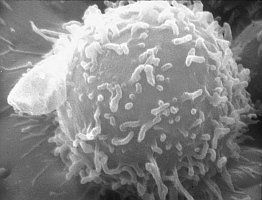3 March 2014. Genocea Biosciences, a biotechnology company in Cambridge, Massachusetts, with Harvard Medical School and Dana-Farber Cancer Research Institute, are testing the company’s vaccine discovery platform to help target therapies for melanoma, an aggressive form of skin cancer. The collaboration is funded by Ludwig Institute for Cancer Research, but financial aspects of the partnership were not disclosed.
Melanoma is a form of skin cancer that occurs less often than the more common types, but is more dangerous and causes more deaths. National Cancer Institute says in 2013, the U.S. reported nearly 77,000 new melanoma cases and nearly 9,500 deaths from the disease.
Genocea develops vaccines and immunotherapies harnessing properties of immune-system T cells, lymphocytes (white blood cells) with receptors that target antigen fragments on infected or cancerous cells, and trigger a toxic response to the invaders. The company’s vaccine-discovery platform, called AnTigen Lead Acquisition System or Atlas, uses a high-throughput screening mechanism simulating the body’s natural immune system’s response to antigen proteins.
Atlas screens proteins from target antigens against T cells from human donors who generate either a successful immune response protecting against the invaders, or an ineffective immune response. This screening process makes it possible to quickly isolate a small number of proteins correlating with natural immunity, from which vaccines can be developed.
Genocea so far applied Atlas to several pathogens, including herpes simplex virus-2, pneumococcus bacteria, chlamydia, and malaria. In the new partnership, the company plans to apply the technology to melanoma, where a biologic drug ipilimumab, a monoclonal antibody already approved to treat metastatic melanoma, has mixed results in generating an immune response: some test subjects in an early stage clinical trial responded favorably, while other subjects did not. Ipilimumab is marketed by Bristol-Myers Squibb as Yervoy.
The collaboration includes Darren Higgins, an immunologist at Harvard Medical School on whose research Atlas is based, and Stephen Hodi and Glenn Dranoff at the Dana-Farber Cancer Institute, who studied the biologic and anti-tumor activities of ipilimumab. Higgins plans to create a cancer antigen protein library for screening in Atlas, while Hodi and Dranoff will isolate blood samples from test subjects who responded positively to ipilimumab.
Genocea will then screen with Atlas the protein library from Higgins’s lab against the cells derived from the test subjects. The aim is to generate a small number of relevant T-cell antigens for further testing and development. The company says the results of the partnership should help identify patients for clinical trials more likely to respond to immunotherapies, as well as better monitor the progress of melanoma patients after treatment.
Read more:
- Trial Underway Testing Pancreatic Cancer Immunotherapy
- Biopharma, University Partner on Blood Cancer Immunotherapy
- Trial Underway Testing Head-Neck Cancer Immunotherapy
- MedImmune, Biotech to Partner on Cancer Immunotherapies
- Early Trial Tests Stem Cell Immunotherapy for Liver Cancer
* * *


 RSS - Posts
RSS - Posts
You must be logged in to post a comment.